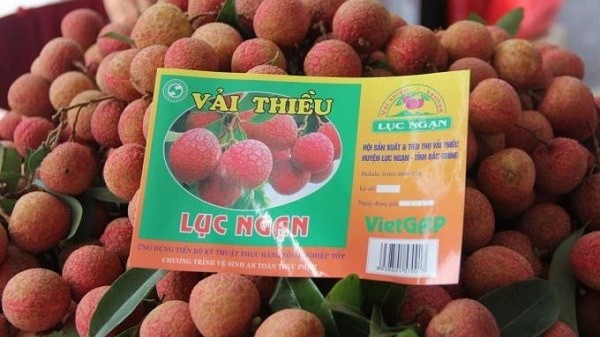
“Thieu lychee kingdom” looks to conquer demanding markets
Latest
| TIN LIÊN QUAN | |
| Japanese experts poised to inspect Luc Ngan lychee exports | |
| Vietnam unique lychee market in full swing | |
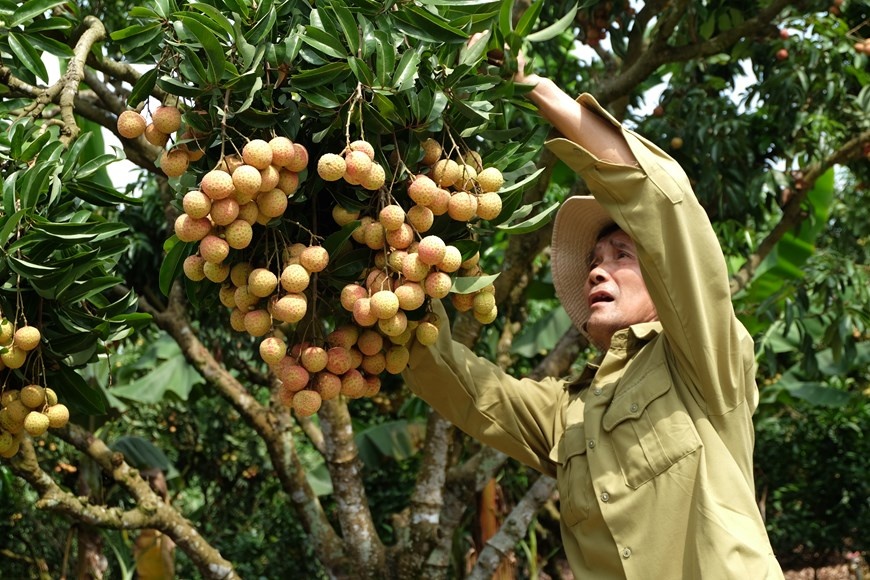 |
| Hong Van An, 68, in Chu township, Luc Ngan district, Bac Giang province, has nearly 40 years of experience planting lychee. (Photo: VNA) |
La Van Nam, Chairman of the district People’s Committee, said that as the COVID-19 pandemic has been brought under control in Vietnam, the locality is preparing scenarios for the production and consumption of its Thieu lychee which distinguishes itself from other varieties with a spherical shape; bright, thin and red peel; thick, white, sweet and juicy flesh; and small seed.
“We are focusing on domestic and traditional markets such as China, Eastern Europe, and the US. Of particular note, this year the district has a new market - Japan.”
The pandemic has now been largely brought control in Vietnam and conditions are favorable for lychee exports, Nam went on. “To do so, we have organized trade promotion activities at border gates with 63 domestic locations and four in China,” he explained, adding that Luc Ngan, known as the “Kingdom of lychee” in Vietnam expects to harvest a total of 85,000 tonnes of Thieu lychee this year.
“We have also worked with counselors in Vietnamese embassies abroad and invited domestic businesses with links to foreign partners to select growing areas with traceability codes, as required by import procedures in Japan and the US.”
Luc Ngan will this year set aside more than 210 ha for growing Thieu lychee for export to the US and more than 90 ha for Japan, Nam said, adding that it plans to export 500 tonnes to the latter. All of its orchards have traceability codes.
Expanding organic areas
The family of Hong Van An, 68, in Chu township, Luc Ngan district, is a pioneering household in growing organic Thieu lychee. He has nearly 40 years of experience planting lychee and his family currently tends about 400 trees on each hectare.
Now, as the fruit is ripe, he and his family rise early in the morning to pick the fruit to guarantee the best taste and look. “Harvesting is the hardest time of the season because we must get up at 4 or 5am. If we started out later, the hot weather would harm the fruit,” An said, wiping out drops of sweat on his face with his bare hands darkened by sap.
“We hope to harvest about 20 tonnes of Thieu lychee this year, down 10 tonnes compared to 2019.”
Despite the cut in production, An said he is still quite happy because he can sell the fruit at about 30,000 VND (1.29 USD) per kg, the same as last year’s price, which is “quite good” in the context of COVID-19 remaining a complex issue in many countries.
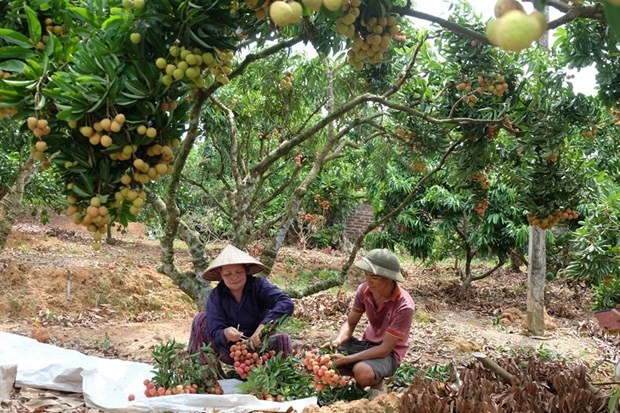 |
| According to An, harvesting is the hardest time of the season, because he and his family must get up early to pick the fruit. (Photo: VNA) |
He added that 60-70 percent of the lychee in his orchard is for export. The fruit is grown under Vietnamese Good Agricultural Practices (VietGAP) standards, with stricter procedures in caring time, including the use of pesticides on a permitted list, and with a number of standards to be met during harvesting.
Organic Thieu lychee possesses many advantages, such as being safe for customers, not harmful to the environment, and being without any residue from plant protection drugs, which help plants grow better and bear tastier, sweeter, and more fragrant fruit.
“During a recent inspection of the lychee in our orchard, Japanese experts recognised our efforts and will check again in the near future to see if it is fit for export to their country,” An said.
Meeting stringent requirements
More than half of Vietnam’s Thieu lychee output is shipped to nearly 30 countries and territories annually. China is the leading foreign market, while the fruit has also found a place on shelves in challenging markets such as the US, Europe, Canada, and Australia.
Luc Ngan’s Thieu lychee has been exported to the US for three years already, said Nguyen Thi Thanh Thuy, a technical officer at the district’s Technical Centre for Agricultural Services.
2020 is set to be the first year the fruit enters Japan, she said, in a move that is hoped to significantly raise the brand value and competitiveness of the district’s specialty.
In late 2019, Japan’s Ministry of Agriculture, Forestry and Fisheries (MAFF) announced the opening of the door to Vietnamese lychee, with regulations in place on imported plant quarantining for the fruit.
This was the result of more than five years of negotiations between the Vietnamese Plant Protection Department at the Ministry of Agriculture and Rural Development and MAFF.
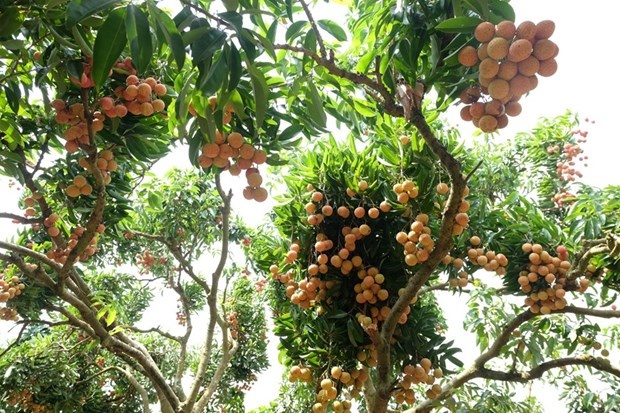 |
| Thieu lychee distinguishes itself from other varieties with a spherical shape; bright, thin and red peel; thick, white, sweet and juicy flesh; and small seed. (Photo: VNA) |
To conquer such a demanding market as Japan, local Thieu lychee growers must satisfy strict requirements, with the fruit being grown at orchards under the supervision of specialists from the Plant Protection Department and possessing origin-tracing codes.
Phytosanitary regulations and food safety standards in Japan must be thoroughly met, and a certificate issued by the Plant Protection Department enclosed with lychee shipments to the country, Thuy added.
“When the Ministry of Foreign Affairs first proposed shipping the fruit to Japan, Luc Ngan district started building a cultivation area dedicated solely for export to the market and closely followed its requirements,” she noted.
Bac Giang will grow 15,000 ha of Thieu lychees under VietGAP standards this year and 80 ha under GlobalGAP standards for shipment to Europe.
The province has zoned off 103 ha with an estimated yield of about 600 tonnes for export to Japan, according to the district People’s Committee.
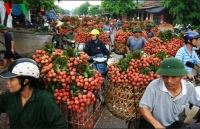
| Japanese experts to inspect fresh lychee exports in Vietnam A number of experts from Japan are poised to arrive in Vietnam on June 3 in order to directly take part in the inspection of ... |
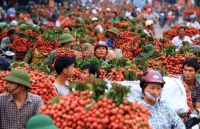
| Export of fresh lychees to Japan faces hurdles in face of COVID-19 Japanese consumers are likely to miss the first chance to taste Vietnamese fresh lychees this year as the Japanese Ministry of Agriculture, Forestry and Fisheries ... |
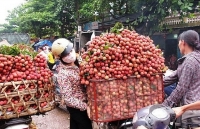
| Vietnam becomes second-largest exporter of lychees Vietnam has become the second-largest exporter of lychees in the world, accounting for 19 percent of the global market share, according to the ... |






